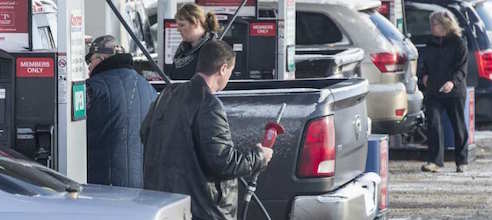
Slaying the myths about Alberta’s carbon tax
Alberta’s new carbon tax is now in effect and is naturally the focus of much debate. Amidst all of this heated discussion, there is plenty of rhetoric, hyperbole and statements that are simply not true. Here is my attempt to slay the four biggest myths about Alberta’s new carbon tax.
The first myth is that Alberta’s households will face crippling increases in the cost of living. Research from Canada’s Ecofiscal Commission (which I chair) shows that Alberta’s $20-per-tonne carbon tax will raise costs by about 1.5 per cent of income for the poorest households and by 0.8 per cent for the richest households. But Alberta’s policy also includes quarterly cash rebates to six out of ten households, depending on their income. The rebates for a low-income couple with two children will be $360 per year, rising to $540 next year (when the carbon tax rises to $30 per tonne). The policy has been designed so that the net impact will be nil for the poorest households and quite small for all others.
The second myth is that the carbon tax will seriously damage the competitiveness of Alberta’s businesses. The policy would indeed be a major mistake if Alberta’s firms responded by simply moving their operations to other jurisdictions with lower (or no) carbon taxes. This is why the Alberta government reduced the small business tax rate by a third, starting this year.
But what about the province’s “large emitters” of greenhouse gases, many of which are producing the oil and natural gas that is the foundation for Alberta’s tremendous wealth? Won’t the carbon tax spell the end of these businesses? The answer is no. These firms will not face the carbon tax until next year, at which point the government will introduce its Carbon Competitiveness Regulation (CCR). The CCR is essentially designed to provide cash subsidies to large emitters based on the level of their output. These cash subsidies go straight to their bottom line, offsetting much of the cost increase created by the carbon tax.
The third myth is that giving money back to households and businesses undermines the effect of the policy. This argument — and it is a very popular one — misses the crucial point of the carbon tax. The point isn’t to reduce total household income and total business profits. The entire objective is to raise specific prices so that households and businesses are led to substitute away from carbon-emitting activities. The cash rebates and output-based subsidies return purchasing power to households and businesses — but they will all still face the price incentive to reduce their emissions.
The fourth myth is probably the biggest one of all — that a carbon tax will simply not cause any reduction of greenhouse gas (GHG) emissions. As consumers we know that we respond to higher prices by adjusting our purchases; businesses similarly respond to higher input costs by switching to cheaper inputs. Such responses to price movements is what makes our market economy tick, which is why a carbon tax — as opposed to intrusive government regulations — is such a pro-market approach to reducing GHG emissions.
What could these behaviour changes look like? Households may use more fuel-efficient vehicles. Or perhaps they will change the way they heat their homes or insulate their basements. Businesses may adjust their behaviour in similar ways, and in addition will have the incentive to develop lower-emitting ways of making their products.
There is plenty of research from Canada and around the world showing that carbon taxes actually do reduce GHG emissions. But nobody should expect dramatic results right away. It takes a while for households and businesses to adjust to new prices. Their responses will gradually occur, and emissions will gradually fall, especially as the carbon tax rises over time.
Alberta’s new climate policy is designed to reduce GHG emissions while protecting the province’s most vulnerable households and also the competitiveness of the business sector. There will no doubt be some growing pains in the first few years. But we shouldn’t let the popular myths get in the way of the facts.
This piece was originally published by the Edmonton Journal on January 19, 2017.




1 comment
You didn’t mention the cost of the additional bureaucracy to implement the the carbon tax in Alberta
Also, you did not mention that possible impact of the Carbon tax in Alberta on the reduction of world GHG emissions is so small that it will not be noticed.
Comments are closed.